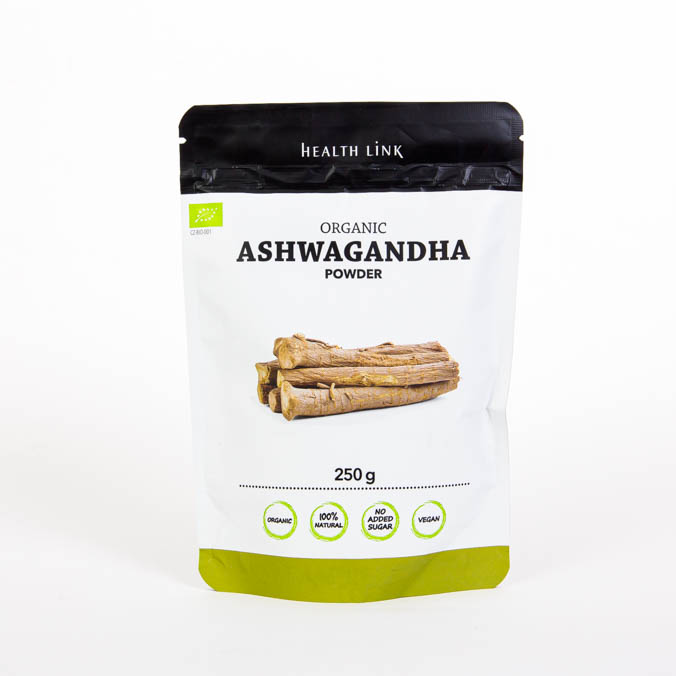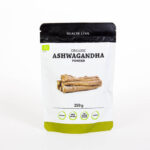Ashwagandha powder 250g BIO
Expiry date: 30.11.2025
11.20 €
Ashwagandha has a sedative and calming effect. This plant is one of the few sedative adaptogens that has traditionally been used to treat anxiety, bad dreams, mild obsessive-compulsive disorder, insomnia and nervous system dysfunction. In Latin, ashwagandha translates literally as ‘sleep-inducer’, but the plant’s name ashwagandha comes from Sanskrit and is a combination of the words ‘ashva’, meaning horse, and ‘gandha’, meaning scent. The root of the plant has a strong fragrance that is specific to the horse.
Beneficial properties of Ashwagandha
- anti-anxiety, sleep disorders (insomnia), stress relief
- reliever of arthritis, back pain, muscle rheumatism.
- regulates thyroid dysfunction
- relieves colds, tuberculosis, asthma and bronchitis
- menstrual pain relief
The recommended dose is half a teaspoonful a day (about 2g).
4 in stock
Sold By: EluvägiDescription
Manufacturer: Health Link s.r.o, Czech Republic
Country of origin: Czech Republic
Organic product label CZ-BIO-001. Produced in non-EU agriculture.
Ashwagandha as a natural stress reliever.
Ashwagandha, popularly known as the stupefying cherimoya, is mainly known as a stress reliever and adaptogen or body balancer. However, unlike the stimulating effects of Chinese ginseng, ashwagandha has a drowsy and calming effect. This plant is one of the few calming adaptogens that has traditionally been used to treat anxiety, bad dreams, mild obsessive-compulsive disorder, insomnia and nervous system dysfunction. In Latin, ashwagandha translates literally as ‘sleep-inducer’, but the plant’s name ashwagandha comes from Sanskrit and is a combination of the words ‘ashva’, meaning horse, and ‘gandha’, meaning scent. The root of this plant has a strong fragrance which has been described as that of a horse.
What is adaptogen?
Adaptogens are stimulants, mainly of natural origin. Scientists do not fully understand how adaptogens work, but they are known to be effective – especially in balancing the hormonal system. Adaptogenic plants bring the body back into balance, whether the thyroid is over- or underactive, for example.
Adaptogens help to protect the body from the harmful effects of the surrounding environment, improve organ function, and prevent the body from abnormalities. Adaptogens also boost metabolism and allow the body to work in a more efficient mode to help resist disease.
Beneficial properties of Ashwagandha
Ashwagandha has been used for the following ailments:
– anxiety, sleep disorders (insomnia), stress.
– Stress, anxiety, anxiety (anxiety, stress, anxiety, anxiety, etc.)
– stress, muscle pain, muscle aches, muscle pain, muscle pain, painful glandular disorders
– colds, tuberculosis, asthma and bronchitis
– menstrual cramps
In addition, ashwagandha is believed to:
– stabilises blood sugar
– lowers cholesterol levels
– increases stamina
– increases concentration
– slows down ageing
– strengthens sex drive and increases fertility
– stimulates exhausted adrenal glands
A remedy for inflammatory disorders
Ashwagandha root acts as an anti-inflammatory and is useful in supporting fibromyalgia (a condition that manifests itself primarily as pain in the muscles, which may be accompanied by bumps that are tender to touch), restless leg syndrome, a mild form of Tourette’ssyndrome (involuntary sounds, vocalizations or words) and osteoarthritis (wear and tear of the joint cartilage). It is also good for autoimmune disorders affecting muscles and joints, such as rheumatoid arthritis (chronic or progressive joint inflammation), ankylosing spondylitis (chronic spinal disease), polymyositis (inflammation of the large muscles) and rheumatoid polymyalgia (characterised by pain and morning stiffness in the neck, shoulder, thigh and hip muscles). The plant is particularly effective for joint problems when cold products and sugar, the main sources of inflammation, are excluded from the diet.
Ashwagandha improves male fertility (increases sperm count and sperm motility), strengthens the sex drive and, thanks to its iron content, helps with anaemia. Ashwagandha also stimulates thyroid function. Studies in mice have shown significant increases in T3 (18%) and T4 (111%) hormone levels after 20 days of use (Panda, 1998).
Administration
A positive aspect of herbal adaptogens or body balancers is that their judicious use does not cause toxic effects. However, they should be consulted with a therapist, counsellor or doctor experienced in this field before being taken in terms of amounts and methods of administration. Ashwaganda powder can be added to porridge, smoothies, made into tea or, in case of insomnia, a teaspoonful of powder mixed with hot milk.
The recommended dose of ashwagandha is half a teaspoon a day (about 2g) mixed with water, milk or juice. As recommended by your therapist or doctor. The dosage and the effects of the herb depend on the person’s age, weight, medical condition and the medication being taken.
Warning
Since ashwagandha slows down the central nervous system, it is advisable to discontinue the use of ashwagandha at least 2 weeks before the planned operation and anaesthesia, as the effects of the medication administered may be stronger than expected during the use of the plant. Also, ashwagandha may increase the effects of sleeping pills and sedatives, so they should not be taken together. It is also not recommended for use during breastfeeding and pregnancy.
Source: https://ecosh.ee





